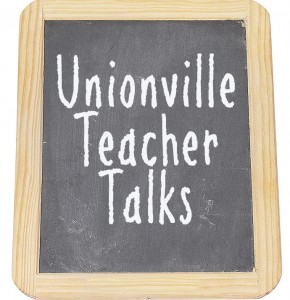Board members ask teachers union to rethink rejection of fact-finder’s report
By Mike McGann, Editor, UnionvilleTimes.com
 EAST MARLBOROUGH — The Unionville-Chadds Ford Board of Education seemed to have one message for its teachers Monday night: please reconsider.
EAST MARLBOROUGH — The Unionville-Chadds Ford Board of Education seemed to have one message for its teachers Monday night: please reconsider.
The Unionville-Chadds Ford Education Association’s rank-and-file members voted down a proposed settlement to the year-long talks for a new contract, as spelled out by a state-appointed mediator on Feb. 7. By state law, the teachers’ union must again vote to reject the deal, approved by the school board on Feb. 7.
The teachers’ union sought the fact-finding process in Dec., 2010 — a process that school officials say cost the district thousands of dollars and numerous man-hours — a point a number of board members made Monday night.
“By law, the teachers are required to vote on this again,” said board member Frank Murphy, who has chaired the negotiation committee for the board. “We would hope that the association would approve it — to get labor peace.”
In light of the current economic environment and various local school districts being forced to furlough teachers and staff, some board members pointed out that most people in the private sector are working just to keep their jobs — and not looking for big raises.
”There’s a time for moving forward, and there’s a time for hanging on,” member Jeff Hellrung said. “This is a time for hanging on. It’s very disappointing. If that view were recognized, we’d be done and have peace.”
Although it remains unclear when teachers will vote again — expected this week — sources suggest it is unlikely there will be much movement in the vote. The main hurdle appears to be the half-step provision in mediator Marianne Schick’s settlement proposal, a provision that union insiders say would set a bad precedent and potentially double service-time requirements for a teacher to reach full seniority — which could have a major impact on teacher earnings over an entire career. There are also some issues regarding health care plans, but the step issue is seen as the major barrier to a settlement at this point.
Association members say they were happy that Schick largely sided with them on virtually all non-economic issues, while board members said they were disappointed with that, but willing to compromise, if it meant getting a labor deal done.
Board members made it clear, Monday night, that they, too were not entirely happy with the proposal, but opted to accept it to gain three years of labor peace and to allow the district to focus on what are likely to be very challenging fiscal issues in the near term.
“This was very difficult for me and for some members of the board to accept,” board president Timotha Trigg said. “This was a tough agreement for us.”
While the board expressed a sentiment of being willing to compromise, there appear to be some points of contention, largely surrounding Pennsylvania State Education Association negotiator Ruthann Waldie. Previously, Waldie filed and then withdrew an unfair labor practices complaint against the district, and now is coming under fire for her claims that Schick, a mediator with 35 years of experience, used inaccurate data in coming up with her proposal.
“There was some criticism that ‘false information’ was used by the fact-finder,” Murphy said. “I see no false information. The data that was used is from the 2000 Census. I disagree with the allegation — it may be somewhat out of date, but it is the most recent data available.”
The 2000 Census data is the most current data — the new 2010 Census data is not expected to be released until later this year.
Board members also questioned whether the union was clouding the issues with statements they don’t feel can be supported by the facts.
“They claim to have a plan in place that would allow the teachers the raise they want without a tax increase,” the board’s Finance Chair, Keith Knauss said. “We’ve asked the union to explain how it’s possible or take it down from the association’s Web site.”
Should the association reject the proposal for a second time, as expected, negotiations are expected to resume shortly, but it remains unclear whether Schick’s proposal will offer a framework for a potential settlement.







